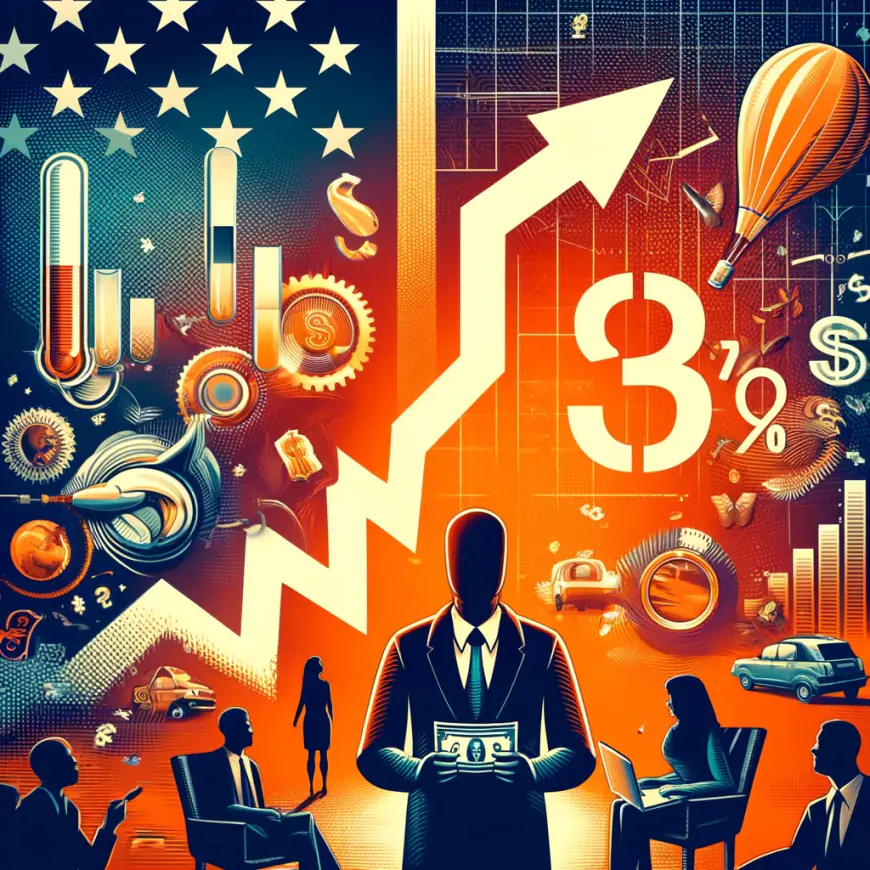U.S. inflation climbs to 3.5%, defying expectations
Defying all odds and expectations, U.S. inflation decided it wasn’t done playing games, climbing up to a sassy 3.5% from March 2023 to March 2024. If anyone thought the rollercoaster was about to stop and let us off, think again. The ride’s operators, a.k.a the Federal Reserve, probably won’t be hitting the brakes on high […]

Defying all odds and expectations, U.S. inflation decided it wasn’t done playing games, climbing up to a sassy 3.5% from March 2023 to March 2024. If anyone thought the rollercoaster was about to stop and let us off, think again.
The ride’s operators, a.k.a the Federal Reserve, probably won’t be hitting the brakes on high interest rates any time soon.
Why? Because the latest numbers from the Bureau of Labor Statistics just threw everyone a curveball by showing that prices didn’t just decide to sprint, rising by 0.4% from February to March alone.

The Fed’s Little Walk
Now, the Fed sitting in its high tower, is caught in a bit of a pickle.
They’ve been hoping for a sign, any sign, that inflation would chill out and start to fall before they even think about reducing borrowing costs. But alas, the universe had other plans, and the data since the year’s start has been like a series of unwanted surprises at a birthday party nobody wanted to attend. This has left economists and market watchers alike pushing back their cozy fantasies of rate cuts to the distant lands of later in 2024.
Douglas Holtz-Eakin, a big brain over at the American Action Forum, didn’t mince words when he said March’s figures didn’t exactly inspire confidence. And when the experts lack confidence, you know it’s time to buckle up.
As if on cue, the stock market decided to join the fun by dipping into the red. Picture the Dow Jones Industrial Average not just stumbling, but tumbling down over 1%. It seems like the timeline for those much-anticipated rate cuts might just clash with the presidential election circus in November.
Talk about awkward timing.
The Fed, trying its best to stay out of the political mudslinging, finds itself stuck with a calendar that doesn’t care about optics.
Even my boy Biden, in between his busy schedule, acknowledged that this spicy inflation report might just push back those rate cuts by a bit. But in true political fashion, he wrapped it up with a “we don’t know for sure.”
But then, honestly guys, who does?
What is Cooking the Inflation Books?
Peeling back the layers, the main culprits of this inflation saga – housing and energy costs – are the usual suspects, taking up more than half of the space in the inflation basket. Rent decided it wasn’t high enough and went up by 0.4% in March, standing tall at a 5.7% increase from the year before. Energy, not wanting to be left out, also jumped by 1.1% in March. And let’s not forget our friend car insurance, contributing its bit to the hot pot of March’s inflation report.

Last year, we saw a bit of a break with inflation cooling its heels thanks to things getting back on track post-pandemic and a chill in gas prices after the whole Russia-Ukraine situation. But just when we thought we could breathe a sigh of relief, the first quarter of this year decided to keep us on our toes with prices warming up instead of cooling down.
The plot thickens when we look at the supercore inflation reading, a fancy term for an inflation measure that kicks out volatile food and energy prices, along with shelter and rent costs. This bad boy accelerated to a 4.8% pace year over year in March, making it clear that the Fed’s 2% dream is still just that – a dream.
With supercore inflation hinting at an annualized rate of more than 8% over the last three months, it’s like inflation decided to go on a marathon without telling anyone.
This whole situation is like being stuck between a rock and a hard place, with inflation refusing to play nice and categories that are usually not optional, like car and housing insurance, making it even harder to tighten the belt.
What does all this mean for the average American?
Well, my dudes and dudettes, it is a sticky situation, with top economists suggesting that we might not see a significant cool-down in service prices any time soon. And with the Fed more likely to keep its foot on the brake until something gives, we’re in for an interesting ride.
On the bright side, if you can call it that, there are some slivers of hope.
Prices in some categories are taking a breather, with used cars, new vehicles, and airline tickets seeing some price drops. And for those of us who’ve been eyeing the grocery bill with dread, there’s a bit of good news – food prices have hit a pause, with the “food at home” index chilling at 0% recently.
There you have it, guys. No conclusions here, just the next chapter in the ongoing story of the U.S. economy.
What's Your Reaction?









































































































